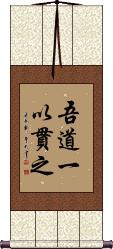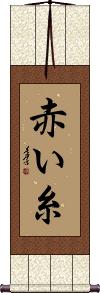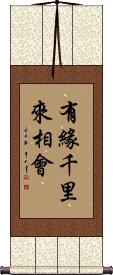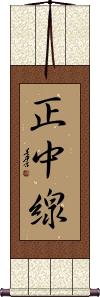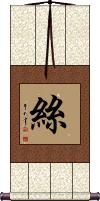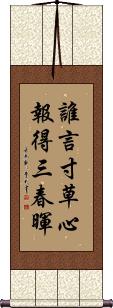Many custom options...
And formats...

Thread in Chinese / Japanese...
Buy a Thread calligraphy wall scroll here!
Personalize your custom “Thread” project by clicking the button next to your favorite “Thread” title below...
1. There is one single thread binding my Way together
4. Brought Together from 1000 Miles Away by Fate
5. Seichusen
6. Silk
There is one single thread binding my Way together
吾道一以貫之 is a phrase from the Analects of Confucius that translates as “My Way has one thread that runs through it.”
Other translations include:
My Way is penetrated by a single thread.
There is one single thread binding my Way together.
My Way is run through with a unifying thread.
My Way is Consistent.
And sometimes poetic license is taken, and it is translated as:
My Way is the only one; I'll treasure it and stick to it with humility until the end.
After this was said, some 2500+ years ago, another disciple of Confucius clarified the meaning by stating, “Our master's Way is to be loyal and have a sense of reciprocity.”
In Japanese, this is purported to be romanized as “Waga michi ichi wo motte kore wo tsuranuku,” though some will argue the true pronunciation.
Note: Sometimes written 吾道以一貫之 instead of 吾道一以貫之 with no difference in meaning.
The Red Thread of Fate
姻緣紅線 is the legendary red string of destiny that binds all soul mates or lovers together.
In ancient Chinese culture, a mythological matchmaker named 月老 (Yuè Lǎo) was the controller of the fate that led lovers to meet. He did this by tying a celestial red string to the ankle of each person. Sometime during their life, they will meet and marry as fate dictates.
While the origin of the red string comes from China, it has spread to other parts of Asia (such as Japan, where it's known as 赤い糸).
The Red String
Thread of Lover's Destiny / Fate
This literally translates as “the red string” or “the red thread” in Japanese, but the real meaning is much deeper...
In Japanese culture, it's believed that fate, destiny, or karma joins lovers by an unseen string, tied around one little finger of each. 赤い糸 is how soul mates find and are drawn to each other.
The Japanese concept of the red thread of fate, by most estimations, comes from Chinese folklore, where it's known as 姻緣紅線. The only difference is that in China, the celestial red thread is tied around the ankles of the lovers (versus what is usually represented as the pinky finger in Japan).
Brought Together from 1000 Miles Away by Fate
有緣千里來相會 means that fate or destiny has caused us to meet from a thousand miles away.
The 有緣 part suggests something that is connected as if by a thread due to fate, destiny, or karma.
This romantic phrase is seen in Chinese greeting cards. It relays the idea that your love was meant to be and that you were destined to meet (regardless of what distance or obstacles might have made such a meeting unlikely).
Seichusen
This is Seichusen, the Japanese martial arts concept meaning “right/correct middle/center line/thread.”
Silk
絲 is the simplest way to write silk in Chinese, Japanese Kanji, and old Korean Hanja.
This can also mean thread, and it is used as parts of words like “silk fabric” or “silk scarf.”
In Japanese, this can be the surname Ito.
絲 is used far more in Chinese for silk (silk comes from China) than in Japanese.
Appreciation and Love for Your Parents
誰言寸草心報得三春暉 is the last line of a famous poem. It is perceived as a tribute or ode to your parents or mother from a child or children that have left home.
The poem was written by Meng Jiao during the Tang Dynasty (about 1200 years ago). The Chinese title is “You Zi Yin” which means “The Traveler's Recite.”
The last line as shown here speaks of the generous and warm spring sunlight which gives the grass far beyond what the little grass can could ever give back (except perhaps by showing its lovely green leaves and flourishing). The metaphor is that the sun is your mother or parents, and you are the grass. Your parents raise you and give you all the love and care you need to prepare you for the world. A debt that you can never repay, nor is repayment expected.
The first part of the poem (not written in the characters to the left) suggests that the thread in a loving mother's hands is the shirt of her traveling offspring. Vigorously sewing while wishing them to come back sooner than they left.
...This part is really hard to translate into English that makes any sense but maybe you get the idea. We are talking about a poem that is so old that many Chinese people would have trouble reading it (as if it was the King James Version of Chinese).
Not the results for thread that you were looking for?
Below are some entries from our dictionary that may match your thread search...
| Characters If shown, 2nd row is Simp. Chinese |
Pronunciation Romanization |
Simple Dictionary Definition |
山 see styles |
shān shan1 shan yamamura やまむら |
More info & calligraphy: Mountain(n,ctr) (1) mountain; hill; (n,ctr) (2) mine; (n,ctr) (3) (mountain) forest; (n,ctr) (4) heap; pile; stack; mountain; (5) protruding or high part of an object; crown (of a hat); thread (of a screw); tread (of a tire); (6) climax; peak; critical point; (7) guess; speculation; gamble; (8) (slang) (kana only) (police and crime reporter jargon; usu. written as ヤマ) (criminal) case; crime; (9) mountain climbing; mountaineering; (10) (See 山鉾) festival float (esp. one mounted with a decorative halberd); (11) {cards} (See 山札・1) deck (from which players draw cards); draw pile; stock; (12) {mahj} wall; wall tile; (prefix noun) (13) (before the name of a plant or animal) wild; (personal name) Yamamura A hill, mountain; a monastery. |
イッチ see styles |
icchi イッチ |
More info & calligraphy: Izzi |
ストランド see styles |
sutorando ストランド |
More info & calligraphy: Strand |
扯 see styles |
chě che3 ch`e che |
to pull; to tear; (of cloth, thread etc) to buy; to chat; to gossip; (coll.) (Tw) ridiculous; hokey |
段 see styles |
duàn duan4 tuan dan だん |
paragraph; section; segment; stage (of a process); classifier for stories, periods of time, lengths of thread etc (n,ctr) (1) step; stair; rung; (flight of) steps; (n,ctr) (2) shelf; layer; tier; (3) grade; level; class; (n,ctr) (4) dan (degree of advanced proficiency in martial arts, go, shogi, etc.); rank; (5) paragraph; passage; (n,ctr) (6) column (of print); (n,ctr) (7) act (in kabuki, joruri, etc.); section; scene; (8) row of the multiplication table (e.g. five times table); (9) stage (in a process); phase; occasion; time; moment; situation; (10) (form) (as ...の段) matter; occasion; (11) (as ...どころの段ではない, ...という段じゃない, etc.) degree; extent; (counter) (12) counter for breaks in written language or speech; (place-name, surname) Dan A piece; a section, paragraph. piṇda, a ball, lump, especially of palatable food, sustenance. |
穿 see styles |
chuān chuan1 ch`uan chuan haku はく |
to wear; to put on; to dress; to bore through; to pierce; to perforate; to penetrate; to pass through; to thread (female given name) Haku To bore, pierce; to thread; to don, put on. To bore a well and gradually discover water, likened to the gradual discovery of the Buddha-nature. |
糸 see styles |
mì mi4 mi itoyanagi いとやなぎ |
fine silk; Kangxi radical 120 (1) thread; (numeric) (2) 0.0001; one ten-thousandth; (surname) Itoyanagi |
紉 纫 see styles |
rèn ren4 jen |
to thread (a needle); (bound form) to sew; to stitch; (literary) very grateful |
紝 纴 see styles |
rèn ren4 jen nin |
to weave; to lay warp for weaving; silk thread for weaving; variant of 紉|纫, to sew; to stitch; thread to weave |
細 细 see styles |
xì xi4 hsi hososaki ほそさき |
thin or slender; finely particulate; thin and soft; fine; delicate; trifling; (of a sound) quiet; frugal (1) (abbreviation) (See 細引き,細糸) fine thread; hempen cord; (prefix noun) (2) slender; narrow; weak; (suffix noun) (3) (as ぼそ) narrowness; (surname) Hososaki Fine, small, minute, in detail: careful. |
絍 see styles |
rèn ren4 jen nin |
to weave; to lay warp for weaving; variant of 紝|纴[ren4], silk thread for weaving To lay a warp, wind, weave [紝]. |
絞 绞 see styles |
jiǎo jiao3 chiao kou / ko こう |
to twist (strands into a thread); to entangle; to wring; to hang (by the neck); to turn; to wind; classifier for skeins of yarn (hist) death by hanging (punishment in the ritsuryō system) Intertwine, twist, intermingle. |
絲 丝 see styles |
sī si1 ssu ito いと |
More info & calligraphy: Silk(surname, female given name) Ito |
綖 𫄧 see styles |
yán yan2 yen en |
cap tassels The threads of beads or gems which hang, front and back, from the ceremonial square cap. |
綟 see styles |
moji もじ |
hemp yarn or linen thread woven into a coarse cloth used for mosquito nets, summer clothes, etc. |
綫 线 see styles |
xiàn xian4 hsien sen |
variant of 線|线[xian4] Thread: a clue, continuation. An intp. of sūtra. |
綸 纶 see styles |
lún lun2 lun rin りん |
to classify; to twist silk; silk thread (female given name) Rin |
緒 绪 see styles |
xù xu4 hsü osachi おさち |
beginnings; clues; mental state; thread beginning; inception; (personal name) Osachi |
緖 see styles |
xù xu4 hsü sho |
variant of 緒|绪[xu4] thread |
線 线 see styles |
xiàn xian4 hsien sen せん |
thread; string; wire; line; CL:條|条[tiao2],股[gu3],根[gen1]; (after a number) tier (unofficial ranking of a Chinese city) (n,n-suf) (1) line; stripe; stria; (n,n-suf) (2) line (e.g. telephone line); wire; (n,n-suf) (3) (See X線) ray (e.g. X-ray); beam; (n,n-suf) (4) line (e.g. of a railroad); track; route; lane; (n,n-suf) (5) outline; contours; form; (n,n-suf) (6) level; (n,n-suf) (7) division; (n,n-suf) (8) (See いい線) line (of action); position; approach; policy; principle; (n,n-suf) (9) (See 線が太い,線が細い) impression one leaves; air one gives off; (surname) Sen A thread, wire, clue, spy, lead, connection. |
緯 纬 see styles |
wěi wei3 wei tsukane つかね |
latitude; woof (horizontal thread in weaving); weft weft; woof (crosswise threads on a loom); (female given name) Tsukane |
縷 缕 see styles |
lǚ lu:3 lü ru |
strand; thread; detailed; in detail; classifier for wisps (of smoke, mist or vapor), strands, locks (of hair) thread |
繞 绕 see styles |
rào rao4 jao hanabusa はなぶさ |
to wind; to coil (thread); to rotate around; to spiral; to move around; to go round (an obstacle); to by-pass; to make a detour; to confuse; to perplex (kana only) (e.g. 道, 起) kanji radical that runs from the left to the bottom part of the kanji; kanji enclosure-type radical; (personal name) Hanabusa To wind round, go round. |
纑 see styles |
lú lu2 lu |
hempen thread; to dress hemp |
股 see styles |
gǔ gu3 ku ko もも |
thigh; part of a whole; portion of a sum; (finance) stock; share; strand of a thread; low-level administrative unit, translated as "section" or "department" etc, ranked below 科[ke1]; classifier for long winding things like ropes, rivers etc; classifier for smoke, smells etc: thread, puff, whiff; classifier for bands of people, gangs etc; classifier for sudden forceful actions (1) thigh; (can be adjective with の) (2) femoral; (1) crotch; crutch; groin; thigh; (2) fork (in a tree, road, river, etc.); tines (of a fork) thigh |
脈 脉 see styles |
mò mo4 mo myaku みゃく |
see 脈脈|脉脉[mo4 mo4] (1) pulse; (2) vein; (3) chain (of mountains, etc.); (4) hope; (5) thread (of an argument) vein |
脉 see styles |
myaku みゃく |
(1) pulse; (2) vein; (3) chain (of mountains, etc.); (4) hope; (5) thread (of an argument) |
貫 贯 see styles |
guàn guan4 kuan nuki ぬき |
to pierce through; to pass through; to be stringed together; string of 1000 cash {archit} crosspiece (between pillars, etc.); penetrating tie beam; (personal name) Hakaru To string, thread, pass through. |
頂 顶 see styles |
dǐng ding3 ting tei / te てい |
apex; crown of the head; top; roof; most; to carry on the head; to push to the top; to go against; to replace; to substitute; to be subjected to (an aerial bombing, hailstorm etc); (slang) to "bump" a forum thread to raise its profile; classifier for headwear, hats, veils etc (1) crown (of head); summit (of mountain); spire; (2) easy win for one; (3) something received; (personal name) Tei Top of the head, crown, summit, apex, zenith; highest; to rise; oppose; an official's 'button'. |
黻 see styles |
fú fu2 fu |
(archaic) embroidery using black and blue thread |
Click here for more thread results from our dictionary
The following table may be helpful for those studying Chinese or Japanese...
| Title | Characters | Romaji (Romanized Japanese) | Various forms of Romanized Chinese | |
| There is one single thread binding my Way together | 吾道一以貫之 吾道一以贯之 | ware dou tsurayuki waredoutsurayuki ware do tsurayuki | wú dào yī yǐ guàn zhī wu2 dao4 yi1 yi3 guan4 zhi1 wu dao yi yi guan zhi wudaoyiyiguanzhi | wu tao i i kuan chih wutaoiikuanchih |
| The Red Thread of Fate | 姻緣紅線 姻缘红线 | yīn yuán hóng xiàn yin1 yuan2 hong2 xian4 yin yuan hong xian yinyuanhongxian | yin yüan hung hsien yinyüanhunghsien |
|
| The Red String | 赤い糸 | akai ito / akaiito | ||
| Brought Together from 1000 Miles Away by Fate | 有緣千里來相會 有缘千里来相会 | yǒu yuán qiān lǐ lái xiāng huì you3 yuan2 qian1 li3 lai2 xiang1 hui4 you yuan qian li lai xiang hui youyuanqianlilaixianghui | yu yüan ch`ien li lai hsiang hui yu yüan chien li lai hsiang hui |
|
| Seichusen | 正中線 | sei chu sen seichusen | ||
| Silk | 絲 丝 | shi / ito | sī / si1 / si | ssu |
| Appreciation and Love for Your Parents | 誰言寸草心報得三春暉 谁言寸草心报得三春晖 | shuí yán cùn cǎo xīn bào dé sān chūn huī shui2 yan2 cun4 cao3 xin1 bao4 de2 san1 chun1 hui1 shui yan cun cao xin bao de san chun hui | shui yen ts`un ts`ao hsin pao te san ch`un hui shui yen tsun tsao hsin pao te san chun hui |
|
| In some entries above you will see that characters have different versions above and below a line. In these cases, the characters above the line are Traditional Chinese, while the ones below are Simplified Chinese. | ||||
Successful Chinese Character and Japanese Kanji calligraphy searches within the last few hours...
